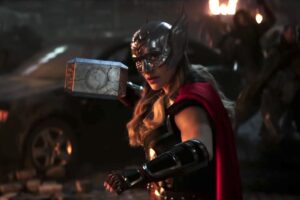I’m truly sorry to all the straight guys out there who missed the memo, but Thor belongs to the gays and the girls now. And before you come at me like “what memo? I didn’t get a memo!”, well, you did, you just didn’t realize at the time that Cate Blanchett strutting around in a black bodysuit and antlers throughout the entirety of Thor: Ragnarok meant that the straights had officially lost custody of the franchise. It’s okay though, you had your shot, you gave us those two depressingly heteronormative Thor movies that nobody liked or watched, now it’s time for you to move over and let Taika Waititi show you how it’s done, AGAIN.

Waititi has been on a roll recently, and it’s in no small part thanks to the loyal queer fanbase he’s amassed. A fourth season of his extremely pansexual paranormal comedy series What We Do In The Shadows has already been shot, and will likely release later this year. The first season of HBO Max’s Our Flag Means Death, a show about queer pirates in the 18th century which Waititi produced and stars in, has been dominating the streaming charts. And Thor: Love And Thunder is only a hundred days from release, and looks to be another surefire hit for Waititi and Marvel with its colorful 80’s aesthetics, zany new characters, and heavy focus on romances – including some queer ones.
There are at least three canonically queer characters in this film, and of those three, King Valkyrie is the one whom we know for a fact will be confirmed as queer onscreen. Technically, actress Tessa Thompson has been playing her as bisexual since her debut in Thor: Ragnarok, but explicit evidence of her bisexuality was left on the cutting-room floor because apparently it distracted from vital exposition…which sounds an awful lot like an excuse to me, but thankfully, King Valkyrie will return in a much larger role in Thor: Love And Thunder, and Thompson has stated as far back as 2018 that her character “needs to find her queen”.
Unsurprisingly, there have been several willing volunteers for that position already, including Jaimie Alexander (the MCU’s Lady Sif) and Brie Larson (whose Captain Marvel is heavily implied to be queer as it is). But in the brief glimpse we catch of King Valkyrie in the first teaser trailer for Love And Thunder, she appears to be merely daydreaming of her many suitors. Dressed in a fashionable black pinstripe suit, she leans back in the throne of New Asgard and zones out while being heckled by ambassadors from other nations. I confess, I’m actually interested to learn more about how New Asgard interacts with the world (i.e. do they participate in Eurovision?), but I would have liked to see her in a less formal setting for this trailer, perhaps even on a date.
Then there’s Korg and Peter Quill, and in both cases the comic versions of these characters are canonically queer while the MCU versions are not…or at least, not yet. To be fair, Quill was only finally confirmed as bisexual in the comics within the last two years, so it’s not like the Guardians Of The Galaxy movies released in 2014 and 2017 had any precedent for making the character bi (not that that should have stopped them, obviously). But now that such a precedent exists, it’s impossible for me to watch this teaser and simply ignore or overlook the implications behind Peter Quill’s subtly flirtatious interactions with Thor.
If only it weren’t equally impossible to be optimistic, given Disney and Marvel’s track-record when it comes to LGBTQ+ representation. Trust me, I desperately want to read way too much into Quill and Thor’s dialogue in this teaser, and the recent reports that Guardians Of The Galaxy Vol. 3 filmed scenes in a gay bar, and the tweets about Quill being bi that Guardians director James Gunn liked last year, but I can’t, or at least I don’t want to, because at the end of the day Quill is a male action hero in a franchise where male action heroes are designed to be salivated over by straight men specifically.
Also, with Chris Pratt continuing to attend and defend an evangelical church that supported the torture of LGBTQ+ people under the guise of “conversion therapy”, I’m not sure if I actually trust him to portray Peter Quill’s bisexuality well, nor do I think it would be received well by the bisexual community regardless. Yeah, it would be cool to have a lead male character in a Marvel movie be revealed as bi, but is it worth it if we have to put up with Chris Pratt either complaining bitterly about it, or worse, using it as a flimsy shield against criticisms of him and his homophobic church? I think I might rather just keep the two queer male action heroes we currently have in the MCU proper.
As for Korg, the friendly rock-giant has previously appeared in Thor: Ragnarok and Avengers: Endgame, but what’s never been mentioned – even in passing – is the fact that he’s a gay character in the comics. I believe there’s a slim chance that this will be remedied in Thor: Love And Thunder through some off-hand line of dialogue, although Waititi has already confirmed that Korg will not have a love interest in the new movie.
I mentioned that there at least three canonically queer characters in Love And Thunder, and we’ve now gone through all of those – but there’s a few more that I want to talk about, because we know from the teaser trailer that Thor will visit Mount Olympus, the domain of the Greek gods, and…well, if you know anything about Greek mythology, you know where I’m going with this. For those who don’t know, the Greek gods were unapologetically pansexual, long before the word even existed. That includes Zeus, who is set to make his MCU debut in Love And Thunder, portrayed by Russell Crowe. There’s a quick shot of him in the teaser trailer, dressed all in gold and holding aloft a lightning-bolt while addressing the gods of Mount Olympus.

Unfortunately for Zeus and probably 99.9% of everyone assembled in that crowd shot, the antagonist of Love And Thunder is none other than Gorr the God-Butcher, who has made it his mission to slaughter every deity from every pantheon, no matter how minor. But even if Zeus doesn’t make it out of this movie alive (and let’s be honest, he probably won’t), there are theories and credible rumors that his son, Hercules, will live to fight another day. Granted, there were also rumors he was the lead character of Eternals, which turned out to be…not true, but he’s the type of character I could easily envision first appearing in a Love And Thunder post-credits scene, clambering out of the rubble of Olympus and turning dramatically towards the camera.
He’s also bisexual in the Marvel Comics – and no, before you ask, I’m not referring to the parallel universe version of Hercules who dated a parallel universe version of Wolverine back in the mid-2010’s, I’m actually referring to the Earth 616 version of Hercules (i.e. the main version of the character) who recently started dating Noh-Varr and was implied to have slept with Northstar as far back as 2010. That Hercules.
So we’ve established that most of the supporting cast in Love And Thunder is, if not canonically queer, then at the very least potentially queer. But what about Thor himself? What about Jane Foster? Do they both just give off intense amounts of bisexual energy, or is there more to it than that?
To the best of my knowledge, neither character is queer in the comics, and while this should probably go without saying, the MCU versions of the characters have never been depicted as queer either. They were written to be star-crossed lovers in the first two Thor films, although it was never entirely clear why – Natalie Portman appeared to be bored out of her mind every time she had to act alongside Chris Hemsworth, and Hemsworth just looked uncomfortable and indifferent. But at the time, every other male action hero in the MCU had an intelligent girlfriend to counterbalance “his brawn with her brains”, and Thor apparently needed one too.
Natalie Portman wisely got out of the franchise before a male director could kill off her character for shock value, and the in-universe excuse for her absence in Thor: Ragnarok was that Jane broke up with Thor somewhere along the line, and it was messy, and they don’t talk to each other anymore. I don’t think they’ll get back together in Love And Thunder, either. There will probably be some romantic and sexual tension between them still (although Portman and Hemsworth need to put some effort into delivering on that front), but I feel pretty certain that by the end of this film the two characters will part amicably, as friends or frenemies, after finally acknowledging and owning up to their mistakes.
There’s a distinct possibility that Jane will also become Valkyrie’s queen, which could be interesting; we know next to nothing about her, so who’s to say she’s not bisexual? That could be something she discovered after breaking up with Thor, or it could be part of why she chose to break up with him in the first place. Thor has been on a journey of self-discovery these past few years, so he can certainly relate.
In fact, Thor might be able to relate on multiple levels. In that aforementioned flirty moment with Peter Quill, it’s Thor who repeatedly tries to lock eyes with Quill while he’s talking about…looking people you love in the eyes. Quill breaks eye-contact and clarifies that he wasn’t talking about himself, leading to an awkward and very intriguing moment in which Thor bites his lip, looks off to the side, and mumbles “What? Just listening”. It might just be a joke that uses homoeroticism as a punchline, which would be disappointing, but fans got very excited about the idea of Thor having a crush on Quill.
(That being said, the claim that was going around social media yesterday that “Thor is canonically pansexual in the comics” is totally false, and I don’t know where that originated but I couldn’t find any source for it. You want to headcanon him as pansexual, be my guest, but don’t go around saying that he is and praising Marvel for it or attacking other people for saying he’s bisexual).

So is Thor: Love And Thunder about to be the gayest movie that Marvel has ever made? You’d better believe it. Is the bar for mainstream LGBTQ+ representation depressingly low? Absolutely. Is this a textbook example of fans (like myself) creating the representation we seek, and doing Marvel’s job for them? Possibly. I have a limited but not insubstantial amount of faith in Taika Waititi to give us representation onscreen, or at the very least to tell us what he wasn’t allowed to show us, and I hope Marvel’s promises regarding better LGBTQ+ representation aren’t entirely empty, but it’s difficult not to be cynical, and I understand the benefits of being cynical.
I won’t say “wait to see the movie”, because I hate that studios are able to lure fans into the theater on the promise of representation alone, but for now I guess let’s just hope for the best.
Trailer Rating: 9.5/10





